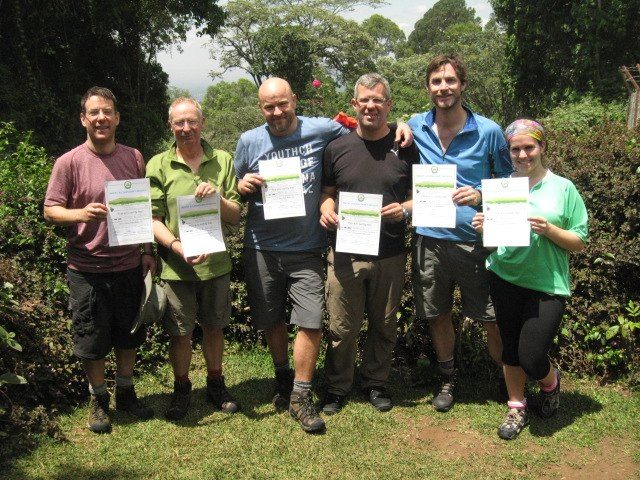On Friday, October 18 a team of six committed people completed the Youth Challenge International (YCI) Kilimanjaro Climb to Give Thanks by reaching the summit at Uhuru Peak. The purpose of the climb was to raise funds and awareness for YCI’s international youth development programs during Canadian thanksgiving. YCI operates youth programs in four locations in Tanzania, some of which are very close to Kilimanjaro, which made the focus on the climb even more relevant. All six climbers reached the summit together to complete YCI’s inaugural Kilimanjaro charity climb with a 100% success rate.
Despite all my preparation and research, the climb exceeded any expectations and turned out to be an experience of a lifetime. African Scenic, an amazing company that relies on word of mouth, selected the Machame Route for YCI, which is known to be the most challenging route on the mountain and takes six days to complete. The route takes you through a variety of stunning flora and fauna as well as different types of trails. One of the coolest moments in the climb (besides Summiting) was climbing the Great Barranco Wall on the third day, which turned out to be the most technical part of the climb.
YCI brought together an eclectic mix of people for this climb that were either directly or indirectly linked to the organization. Passionate about YCI’s vision for the climb and full of energy, the team assembled from three continents and hit it off straight away. From Day 1, the team bonded, laughed, joked, and connected; most importantly, the team stuck together every step of the way, without exception. There was not a single moment when anyone was left behind, where anyone didn’t belong, where anyone didn’t contribute to the whole team. With five men over forty and one female under 25 known as ‘the kid’, you might expect some challenges, but there were none.
As soon as the team started the climb, it became clear that we were going to reach the summit together or not at all. On Day 1 of the climb, we connected with the amazing team of guides and staff from African Scenic and the team spirit continued to be contagious. The team of six, which only met one or two days before, soon became a team of 12 or more. I have never seen a team come together around a cause and overcome every physical and mental obstacle to achieve the goal. The power of the team led to the success of the YCI Kilimanjaro Climb to Give Thanks through sharing, giving, laughter and one common goal.
Everyday, we started the day with our slogan “who’s got it better than us? No one”.
There could have been nothing further from the truth.
– Bryan Cox, Executive Director, YCI Kilimanjaro Climb to Give Thanks 2013
If you missed out on the climb this year and would like to make a contribution to YCI’s life-changing youth development programs, you can donate here










